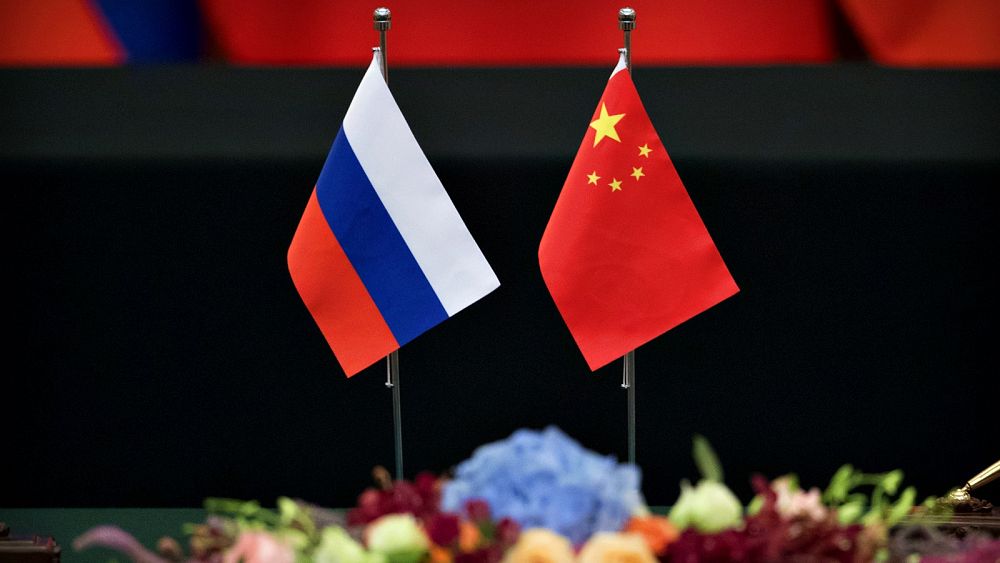World
EU sanctions on Russia face the next frontier

The EU is discussing plans to sanction companies suspected of helping Russia evade international sanctions.
The European Union wants to make sanctions work – but just how far will it go?
As part of its 11th round of sanctions, the European Commission has proposed new measures to “crack down” on circumvention, as Ursula von der Leyen put it during a trip to Kyiv to mark Europe Day.
With most EU-Russia trade heavily restricted or downright prohibited, Brussels is now pointing the finger at people, companies and even entire countries suspected of helping Moscow evade the penalties by acting as transit destinations for EU-made products that are, coincidentally, under sanctions.
“We’ve recently seen a growth of highly unusual trade flows between the European Union and certain third countries – these goods then end up in Russia,” von der Leyen said.
Although the proposal’s details were not made public, the new mission to chase after Russia’s enablers immediately raised the spectre of a scourge that has for years haunted the bloc: extraterritoriality.
The limits of jurisdiction
As a foreign policy tool, sanctions are applied at the discretion of sovereign countries to punish what they consider to be unlawful, or at least objectionable, behaviour conducted by another person, entity or state. While in most cases the reprehensible behaviour continues in defiance of international censure, as Russia’s war clearly proves, sanctions can serve additional purposes, such as economic pressure, deterrence, isolation and criticism.
Assets freeze, travel bans and trade restrictions are among the most common restrictive measures rolled out. But one common denominator remains: sanctions are introduced within the jurisdiction of the sanctioning country.
In fact, even if we talk about sanctions against Russia, in reality, the sanctions are not imposed inside Russia as the EU, for obvious reasons, lacks jurisdiction across the country’s territory. What the bloc does instead is impose obligations on its own member states and companies over their interactions with Russia. For example, European firms are prohibited from importing Russian coal.
This way of working grants countries a fairly wide margin of action, from targeted restrictions on certain key products to broad bans that encompass entire sectors.
In recent years, however, a new strategy to enforce maximum compliance has emerged, most notably from the United States which has promoted the use of extraterritoriality, also known as secondary sanctions, on entities that fall strictly outside its jurisdiction.
One such case was when the administration of former President Donald Trump pulled out of the Iran nuclear deal, re-introduced sanctions that had been previously lifted, and threatened to punish companies still doing business with Teheran, regardless of their geographic location or ownership.
Brussels reacted with outrage: Why would European firms abide by American law? Why would European investors pay the price of a decision unilaterally taken in Washington?
But the mere thought of losing access to the dollar sent chills down the spine of Europeans, who were forced to choose between America’s mighty financial market and Iran’s troubled economy.
“We’re talking about the extension of the reach of domestic law overseas. These are extraterritorial sanctions which mostly discourage companies and individuals of third parties to do business with the targeted countries,” Viktor Szép, an assistant law professor at the University of Groningen, told Euronews.
“The US is basically extending its jurisdiction to non-US persons on a quite wide scale. And given that many large companies have links with the US, then US laws have considerable outreach, especially in the field of international banking.”
The EU has traditionally opposed any sort of extraterritorial sanctions, arguing they impinge on its sovereignty and independence. Its fierce resistance was carved in a 1996 law known as the Blocking Statute, a direct reply to US sanctions imposed on Iran, Cuba and Libya.
The statute forbids EU operators from complying with extraterritorial sanctions, nullifies rulings issued by foreign courts and allows the seeking of compensation for damages. It was later updated to counteract American retaliation in the Iran case, although the exodus of European companies from Teheran was by then uncontainable.
“The European Union has always seen extraterritorial sanctions as something which goes against international law,” Szép said. “EU sanctions have never been extraterritorial, which means they do not apply to non-EU companies or individuals that do business entirely outside the Union.”
That long-established opposition was pushed to the limit last year when the G7 introduced its price cap on Russian crude oil. On paper, the cap was a primary sanction. But in practice, it reverberated across the world as many other countries were constrained to follow the cap in order to get hold of cheap Russian oil, whose commerce depends on Western insurance and shipping firms.
Pushing the envelope
Diving head-on into extraterritoriality would undoubtedly represent a major leap for the EU’s foreign policy and add to a record of major taboos broken since the Kremlin launched the invasion.
In the 8th package of sanctions, the bloc agreed on a provision to blacklist individuals of any nationality that facilitate the evasion of penalties. The 11th round would go much further, targeting companies, or even entire countries, accused of selling sanctioned goods to Russia.
But to force non-EU entities to abide by EU law, the bloc will need leverage that is strong enough to make others think twice.
The US enforces its sanctions globally by employing the dollar as a carrot and stick. The euro alone is unlikely to replicate the dollar’s deterrent effect, meaning the EU will have to come up with additional economic elements to wield as a bargaining chip.
“The European Union is, to some extent, a newcomer in the arena of secondary sanctions,” Tom Ruys, a professor of international law at Ghent University, said in an interview.
“Europe does not have the same clout as the United States does with its access to the US financial system, with the weaponisation of the dollar, which is still vital for a wide range of financial institutions worldwide. I’d say this is something unique to the United States.”
According to Ruys, the EU has three possible avenues to clamp down on circumvention: restricting access to its wealthy internal market, launching criminal proceedings in national courts against those suspected of sanctions evasion, and adding more companies to the bloc’s blacklist.
The blacklist is seen as the safest option thanks to its iron-clad track record and its somewhat limited scope: in practice, it translates to asset freezes and travel bans, something akin to name-shaming. By simply listing non-Russian companies, experts say, the EU could narrowly avoid the use of extraterritorial measures and the full-blown retaliation that comes with it.
But others might see things differently. China, a country that is under scrutiny for its close military and economic ties with Russia, has issued an unambiguous warning to Brussels.
“We are against states introducing extraterritorial or one-sided sanctions on China or any other country according to their own domestic laws. And if that were to happen we would react strictly and firmly,” said Qin Gang, China’s foreign affairs minister, in a visit to Berlin.
The possibility of Chinese countersanctions, the likes of which the EU has suffered in the past, could see member states steer towards a much more targeted approach, possibly focused on curbing specific exports rather than punishing companies or countries, said Maria Shagina, a senior research fellow at the International Institute for Strategic Studies (IISS).
“Berlin and Paris are allergic to any use of extraterritorial sanctions, so the new designations will have to have an EU nexus, meaning that a third country can be added to the EU sanctions list if EU sanctions are violated. Nevertheless, this is evidence of a more assertive and geopolitical EU willing to push the envelope,” Shagina told Euronews.
“The big question is, which countries will end up on the list? Kazakhstan and Armenia are more likely than China or Turkey.”
Von der Leyen has tempered that the upcoming mechanism will be used “cautiously,” as a “last resort” following a “very diligent risk analysis”. This reflects the awkward position the EU is in today, caught between its aversion to extraterritoriality and its desire to make sanctions work.
Regardless of the final outcome of negotiations, the next round of sanctions will have to deal with the same inherent weakness that has dented the effectiveness of the previous ten rafts: while EU sanctions are designed and agreed upon collectively, their enforcement takes place on a national basis, making them prone to asymmetrical results.
By contrast, the US implements its penalties with the full prowess of its federal government.
“Whenever new sanctions are invented, the targets will adjust themselves, creatively seeking ways to circumvent those measures, especially now where the stakes are so high because the target is one of the major economies in the world. The incentive to exploit loopholes in the fabric is also much more prevalent,” said Tom Ruys.
“It’s a constant cat-and-mouse game. And we haven’t seen the end of it.”

World
Italian state railways plans 1.3 bln euro investment in solar plant

World
Christmas in Puerto Rico is a 45-day celebration with caroling, festive decorations, family feasts and more

Christmas, Navidad in Puerto Rico, extends far beyond Dec. 25.
The island proudly proclaims itself as having the “longest holiday season in the world,” according to the website Discover Puerto Rico.
On average, the holiday festivities in Puerto Rico last about 45 days, per the source, commencing right after Thanksgiving, and stretching all the way through mid-January.
The Christmas season in Puerto Rico typically lasts around 45 days. (iStock)
HOW TO SAY ‘MERRY CHRISTMAS’ IN 10 LANGUAGES TO FRIENDS AROUND THE WORLD
The holiday season in Puerto Rico is full of rich traditions beloved by families.
One tradition those who visit Puerto Rico will immediately notice during the holiday season is decorations.
In Puerto Rico, decorations are typically put up by Thanksgiving, and kept up until the season concludes in mid-January, with opportune picture moments at every corner.
Parrandas, Christmas caroling, is a holiday staple.
17 SECRET TRAVEL TIPS FOR FALL AND WINTER THAT AREN’T SO SECRET AFTER ALL
Carolers choose houses of family and friends to visit, typically starting around 10 p.m., performing aguinaldos (traditional Christmas songs), with not only their voices, but often with instruments as well, according to Discover Puerto Rico.
The group you begin caroling with is likely not the same group you end with.
In Puerto Rico, when carolers visit a house, they’ll often stop inside for conversation, food and drink before moving to the next residence.

Coquito is a popular beverage enjoyed during the holiday season in Puerto Rico. Coconut, vanilla and rum are among the ingredients. (Mayra Beltran/Houston Chronicle via Getty Images)
Usually, the residences of the house visited will join the group for the next house, according to Discover Puerto Rico.
CHRISTMAS TREES IN GERMANY WERE DECORATED WITH APPLES INSTEAD OF ORNAMENTS IN THE 1600S FOR ‘ADAM AND EVE DAY’
A night of serenading loved ones can last quite a while, often stretching into the early morning hours of the following day, according to the source.
The biggest day of the holiday season in Puerto Rico actually isn’t Christmas, but instead, the night before.
In Puerto Rico, Dec. 24 is Nochebuena. On that day, loved ones gather for the exchange of gifts, caroling and a large feast.
Many families will also attend a midnight Mass on the day, known as Misa de Gallo.
FLIGHT ATTENDANTS REVEAL THE SURPRISING DAY TO TRAVEL AHEAD OF THE CHRISTMAS RUSH
After Christmas passes, the festivities go on in Puerto Rico.
Another big event in the holiday lineup is Three Kings Day on Jan. 6, a holiday that “commemorates the visit that the Three Wise Men paid to Jesus after his birth,” according to Discover Puerto Rico.
On the eve of the day, children fill up a shoebox with grass to be left for camels to munch on while the Three Kings leave behind gifts for them, according to PuertoRico.com.
For a particularly festive Three Kings Day, Juana Díaz is the place to go, as it hosts the largest celebration in Puerto Rico for the holiday. In Juana Díaz, there is an annual festival and parade in honor of Three Kings Day that brings together over 25,000 people every year, according to Discover Puerto Rico.

Gifts are primarily exchanged between loved ones on Christmas Eve in Puerto Rico. (iStock)
Then, eight days later is Octavitas, a post-holiday celebration where families get together and celebrate one last time for the season.
The end of the holiday season is marked with the San Sebastián Street Festival.
This festival, spanning over multiple days, takes place in Old San Juan, and is filled with live music, dancing, shopping and parades.
World
Small plane crashes into Brazil town popular with tourists, killing 10

Twin-engine plane crashed in largely residential neighborhood of Gramado shortly after takeoff, authorities say.
A small plane has crashed into a tourist hotspot in southern Brazil, killing all 10 people on board and injuring more than a dozen people on the ground, officials have said.
The twin-engine Piper PA-42-1000 hit the chimney of a home and the second floor of a different house before crashing into a shop in a largely residential neighbourhood of Gramado shortly after takeoff from Canela, Brazil’s Civil Defense agency said on Sunday.
Rio Grande do Sul Governor Eduardo Leite told a news conference that the aircraft’s owner and pilot, Luiz Claudio Galeazzi, was killed along with nine members of his family.
Leite said that 17 people on the ground were injured, 12 of whom were still receiving treatment in hospital.
Galeazzi’s company, Galeazzi & Associados, confirmed that its CEO and Galeazzi’s wife and three daughters had died in the crash.
“Luiz Galeazzi will be forever remembered for his dedication to his family and for his remarkable career as a leader of Galeazzi & Associados,” the company said in a post on LinkedIn.
“In this moment of immense pain, Galeazzi & Associados is deeply grateful for the expressions of solidarity and affection received from friends, colleagues and the community. We also sympathize with all those affected by the accident in the region.”
Gramado, located in the Serra Gaucha mountains, is a popular destination for vacationers, especially during the Christmas season.
The crash comes a little more than a year after Brazil suffered its worst air disaster in nearly two decades when a twin-engine plane crashed in the southeastern city of Vinhedo, killing all 62 people on board.
-

 Politics1 week ago
Politics1 week agoCanadian premier threatens to cut off energy imports to US if Trump imposes tariff on country
-
/cdn.vox-cdn.com/uploads/chorus_asset/file/25789444/1258459915.jpg)
/cdn.vox-cdn.com/uploads/chorus_asset/file/25789444/1258459915.jpg) Technology1 week ago
Technology1 week agoOpenAI cofounder Ilya Sutskever says the way AI is built is about to change
-

 Politics1 week ago
Politics1 week agoU.S. Supreme Court will decide if oil industry may sue to block California's zero-emissions goal
-
/cdn.vox-cdn.com/uploads/chorus_asset/file/25546252/STK169_Mark_Zuckerburg_CVIRGINIA_D.jpg)
/cdn.vox-cdn.com/uploads/chorus_asset/file/25546252/STK169_Mark_Zuckerburg_CVIRGINIA_D.jpg) Technology1 week ago
Technology1 week agoMeta asks the US government to block OpenAI’s switch to a for-profit
-

 Business1 week ago
Business1 week agoFreddie Freeman's World Series walk-off grand slam baseball sells at auction for $1.56 million
-
/cdn.vox-cdn.com/uploads/chorus_asset/file/23951353/STK043_VRG_Illo_N_Barclay_3_Meta.jpg)
/cdn.vox-cdn.com/uploads/chorus_asset/file/23951353/STK043_VRG_Illo_N_Barclay_3_Meta.jpg) Technology1 week ago
Technology1 week agoMeta’s Instagram boss: who posted something matters more in the AI age
-
News1 week ago
East’s wintry mix could make travel dicey. And yes, that was a tornado in Calif.
-
/cdn.vox-cdn.com/uploads/chorus_asset/file/24924653/236780_Google_AntiTrust_Trial_Custom_Art_CVirginia__0003_1.png)
/cdn.vox-cdn.com/uploads/chorus_asset/file/24924653/236780_Google_AntiTrust_Trial_Custom_Art_CVirginia__0003_1.png) Technology2 days ago
Technology2 days agoGoogle’s counteroffer to the government trying to break it up is unbundling Android apps



















